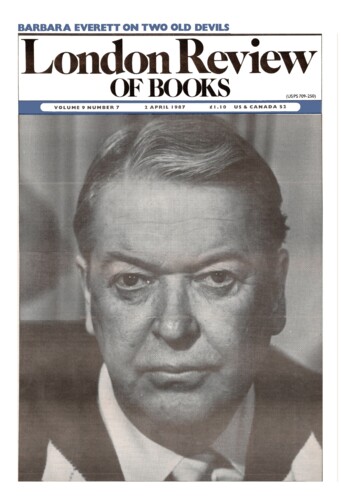Old people will tell you that after death the soul passes over Whinny-moore, a place full of whins and brambles, and … would be met by an old man carrying a huge bundle of boots; and if among these could be found a pair which the bare-footed soul had given away during life, the old man gave them to the soul to protect its feet whilst crossing the thorny moor.
Richard Blakeborough, Wit, Character, Folklore and Customs of the North Riding of Yorkshire (1911)
I was back walking on Lothersdale Moor,
through ling, blackthorn and blips of sheepshit,
over dry-stone walls and up kestrels’ airstreams,
back with the becks and original sources,
to land on the fell road under Pinhaw
beside the steamed-up hatchback of a Ford.
The driver’s window opened as I stood there.
‘Tha’ll catch thi death – get in an warm thisen’
said the heathery face, open, bloodshot,
leaning across to unlock the other door.
I limped around and took my seat beside him,
cupping my bones about his leather flask.
That highland nip restored me to the land
of the living and I warmed to my tale:
how I had hiked the backs of the Pennine Way,
leaving at dawn from Todmorden to end –
‘down there, see, if this mist would just clear up
a bit’ – in the shade of Thornton church.
He glanced, disbelieving, at my plimsolls,
frayed and holy with a flapping sole.
He was a rep for Peter Lord, he said,
nodding behind him at the bootful of boots.
‘Ah’ve worked in shoes near alf a century
an sin all t’flippin lot go reet down’ill.’
Then he asked who I was. ‘Morrison, eh,
a name for up ere. I knew thi father well
an t’ole surgery in Water Street.
E did is best by Earby, wi disease an that,
aye an thi mother too, deliverin bairns.
Ad thi no mind to follow in their shoes?
‘Ere, ave another swig – tha’s like a sheet
what started out as peachy then lost
its colourin in t’wash. Ah tell thi what:
you tek these pumps off me to elp thi ome.
They’re seconds, any road, an just your size,
an tha’s some sloggin still to Thornton.’
Then I was out beside him shaking hands
as he clattered off across a cattle grid,
turning left down to Elslack by the pines.
He should have come out by the Tempest
but the roak was too mawky to see beyond
the reservoir and he vanished in thin air.
That cardboard box was all I had to show
for our meeting, its pair of char-black pumps
like the ones I’d brought from school for Jeffrey Holmes
the Christmas break after his accident,
the lorry that flicked him from his bicycle
turning my mate into a sickbed ghost.
I laced the eyelets for the journey on
across the bogs and sandylands of moor.
Beside the ink-blot of a rookery
I could make out the nib of Thornton church,
and up behind, like an act of kindness,
a perched, solitary, whitewashed farm.
And in the gorse and peat and heather-scorch
his voice came back again like judgment,
the voice of the tarns with their millstones,
a cairn of slingshot stopping me in my tracks
until the wind brought the grit of a Hargreaves
or one of the Barnoldswick MacBrides:
Get on wi thee, stuck there in t’ bracken
maunderin and moulderin like a corpse.
What odds would it ave made tha stayin put?
Didst think tha could cure us like thi father?
If tha’d not buggered off at twenty
tha’d as like be a boss at Silentnight,
layin us off wi no brass or future
in this valley of dead vases an mills.
So thank thi lucky stars yon ol divel’s
gi’en thi some pumps to get ell out again
an shift thisen sharpish to t’nearest stickle
afore tha’s eaten up by t’worms or us.
Send Letters To:
The Editor
London Review of Books,
28 Little Russell Street
London, WC1A 2HN
letters@lrb.co.uk
Please include name, address, and a telephone number.

